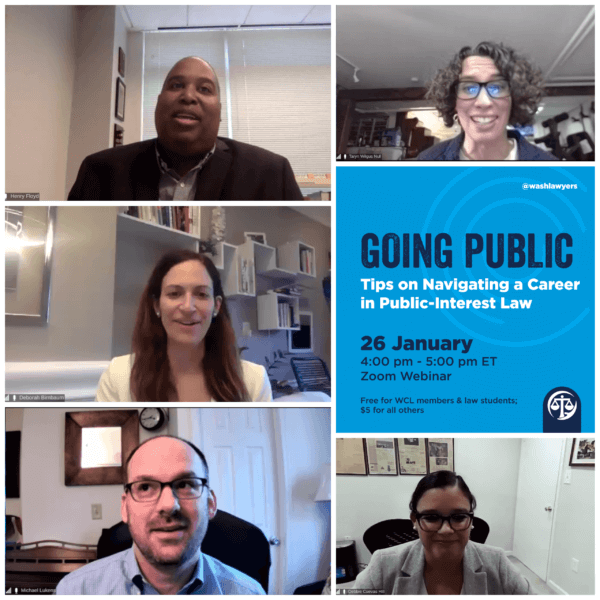
Going Public: Tips on Navigating a Career in Public Interest Law
By Shea Hazel
On Wednesday, January 27, 2021, Washington Council of Lawyers hosted an in-depth discussion on how to navigate to a public-interest career, how to be successful once you get there, and how to thrive in an often emotionally taxing career path. It was an inspiring conversation with concrete tips to help guide those in pursuit of meaningful public-interest paths.
Panelists included Washington Council of Lawyers board members Debbie Cuevas-Hill, Senior Staff Attorney, AARP Legal Counsel for the Elderly; Michael Lukens, Associate Director, Capital Area Immigrants’ Rights (CAIR) Coalition; and, Taryn Wilgus Null, Senior Trial Attorney, U.S. Department of Justice, Civil Rights Division, Employment Litigation Section.
A Message of Passion and Professionalism
Introduced by board member Henry Floyd, an associate at Koonz McKenney Johnson & DePaolis LLP, and moderated by board member Deborah Birnbaum, Assistant General Counsel at the Office of the United States Trade Representative, the message from the panelists was clear: passion, professionalism, and integrity will help you build your reputation and enhance your preparation to excel as a public-interest lawyer.
Panelists started at the beginning. They shared how their interests in law school evolved, motivated their class choices, influenced the jobs they applied for, helped them adapt to the available job market, and how those interests adjusted and expanded as their careers evolved.
Advice for Current Law Students on Course Selection
“As a lawyer, you have lots of skills and can use them lots of ways.”– Debbie Cuevas-Hill
Clinics – Clinics and internships are valuable and highly encouraged. Also, post-graduate legal fellowships and judicial clerkships can be an excellent start to a public-interest career. Taryn summed up the clinic experience thusly, “Hands down, the best experience I had in law school was the clinic I took. If you’re able to take a clinic, it is such an invaluable experience: really getting in there, handling real cases, and representing clients.” And in terms of what employers seek with respect to law school experience, Michael said that at his organization, “We always prioritize someone who has clinical experience when looking at resumes.” Across all employers, Debbie advised, “Experience working with clients is really important.”
Litigation – If you’re interested in going into litigation, know that you will use all the basic knowledge you gained in law school. Your practice will frequently draw upon the concepts taught in property, contracts, and civil procedure. Classes in negotiation also will be extremely beneficial.
Ethics – Pay attention to ethics courses and take an advanced ethics class if available. Ethics issues are everywhere and taking an extra ethics class will be highly beneficial.
Passion – Be passionate and demonstrate interest and commitment in your job search and after you get the job. Update your cover letter to ensure it demonstrates actual interest and reflects passion. Deborah shared when she was in a position to evaluate candidates one thing she keyed on was a candidate’s ability to draw on past relevant experiences. The panelists agreed that if you want a job, apply for it! You have to put yourself out there to move your career forward. Demonstrate that you want the job you applied for, not just a job. Be prepared for your interview and be able to relate your experiences to what the position would require. As Michael said, “You can’t fake passion.”
Language Skills – Many clients in public-interest law are not native English speakers. Consider your language skills upfront. If you’re looking to advance your foreign language skills, there are many resources available. One free and easy one is duolingo.
Words of Wisdom
“To do your job as a lawyer, you need to have really good people skills. We all want colleagues who are easy, pleasant, and fun to work with. Be able to get along and talk to all different types of people, relate to them, and build rapport and trust.” – Taryn Null
“The most effective lawyers are the ones that can listen. Listening and understanding different perspectives is essential.” – Deborah Birnbaum
“There may be a misplaced assumption that you know how to be an attorney or comport yourself in a professional manner. Your mentors may not help you develop that skill. Ask where you fit.” Michael Lukens
“Have initiative. If you’re really interested in a project and have the time to focus on it, don’t be afraid to ask how you can be of assistance. Be yourself. When you’re not, it’s pretty apparent. Be genuine.” – Debbie Cuevas-Hill
Build Relationships
“Take time to breathe, enjoy growing and learning. Proactively stay in touch with folks and network!” – Deborah Birnbaum
One great way to stay connected is by joining Washington Council of Lawyers. New members gain access to the bi-monthly Public Interest Jobs Clearinghouse, discounted rates on trainings and events, and professional development opportunities throughout the year.
Stay in-the-know through our Pro Bono Publico Blog and engage in the discussions important to the public-interest community on our social media platforms.
Shea Hazel is a Public Interest Law Fellow at UMass Law and a member of Washington Council of Lawyers’ Membership Committee.






